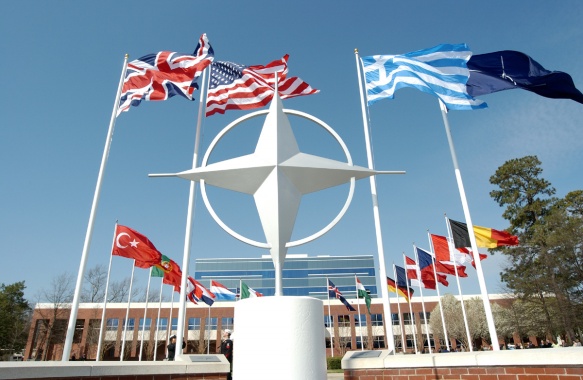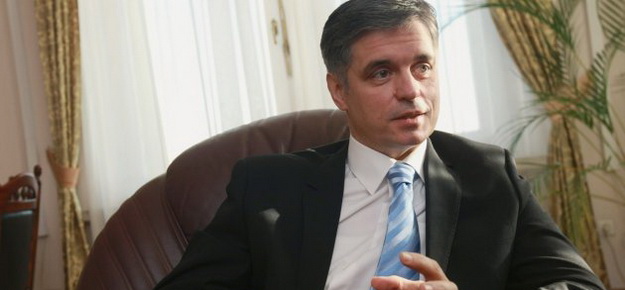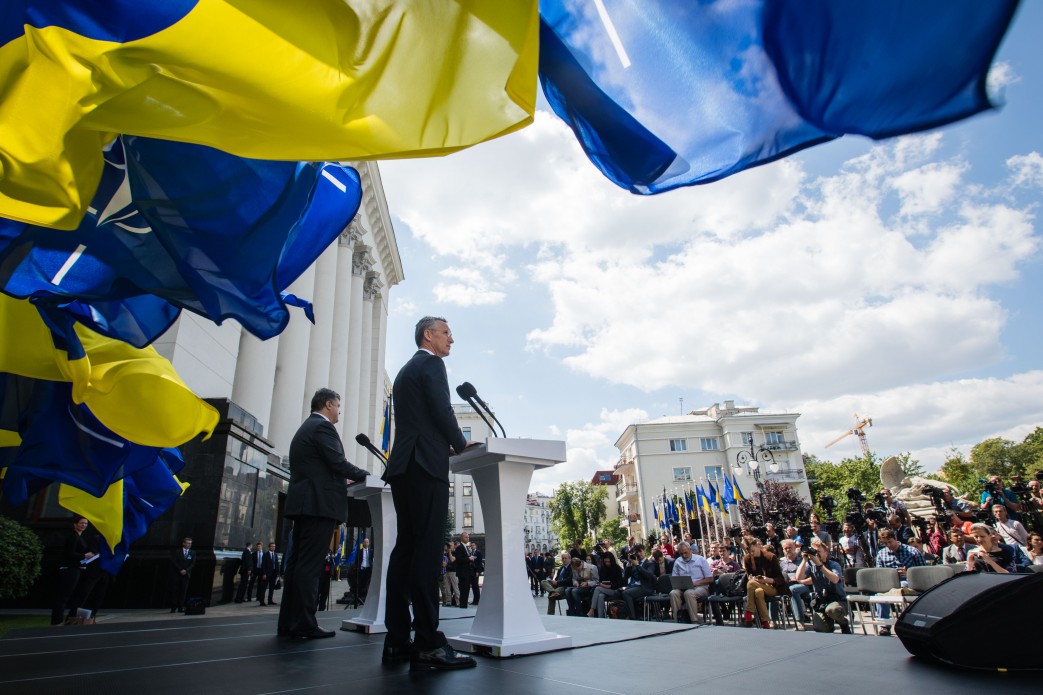by Thomas C. Theiner - https://twitter.com/noclador
The Russian invasions of Crimea, Luhansk and Donetsk, along with the new Putin doctrine, whereas Russia reserves the right to invade any country on a Kremlin whim, must be countered militarily by NATO. Each European nation on its own is too weak to withstand a Russian attack; together the free nations of the West outnumber Russia’s military five times in men and twenty times in modern equipment. Therefore NATO members do not need to return to the mass armies of the Cold War, but all members must spend more on defense, invest in equipment and troops that are suitable for territorial defense and allow NATO to take command of Europe’s defense once more. Specifically NATO members must accept that:
NATO is not for free: Each member must spend at least 2% of GDP for defense and provide NATO with a minimum amount of land, naval and air forces. (i.e. each member must commit at least one combat brigade for each five million inhabitants.) Members that fail in this goal will be fined to the tune of $ 300 million yearly for each missing brigade. Money from these fines will be split among members who field more combat brigades than required. The same system will apply to air forces and naval forces, which means that the Czech Republic, Hungary and Slovakia will have to procure and deploy naval assets or get fined.
Members whose defense expenditures fall short of 2% of GDP, will have to compensate for the shortfall by providing weapons and equipment to other NATO members. (i.e. if Germany were to spend only 1.7% of GDP on its Armed Forces it would have to deliver weapons and equipment from its defense industry equal to 0.3% of its GDP to other NATO members.) Both measures are meant to force members, which underspend and underman their militaries, to share equally in the common defense by bankrolling other members’ extra combat formations and armament programs. Members who refuse to share equally in the common defense will be asked to leave NATO promptly.
NATO must standardize more: Currently each NATO member organizes its military as it likes. This has to stop. NATO needs to establish unified unit structures from company to brigade and from squadron to wing. Such unified structures for all combat units will improve interoperability and allow NATO to dispatch troops much faster.
Additionally NATO must cut down its myriad parallel defense programs by establishing a procurement command, which will coordinate development and procurement. This command must have the power to force members to merge similar procurement programs. (i.e. currently Germany, Poland and Türkiye each spend hundreds of millions to develop a tracked infantry fighting vehicle, while Italy and Spain recently introduced their own type of tracked infantry fighting vehicle. Such parallel programs need to be cut down to a maximum of two to reduce financial waste, maintenance expenses and field logistics.
NATO must re-arm: After the end of the Cold War member countries recklessly reduced their armored forces. Today no NATO member except for the US, Poland, Türkiye and Greece has an armed force capable of repelling an invading force. European NATO members are short of main battle tanks, tracked infantry fighting vehicles, self-propelled artillery, self-propelled anti-aircraft guns, attack helicopters, fighter jets, precision guided ammunition, armed drones, cruise missiles, vertical launch system equipped ships, land based anti-ship missiles, long range anti-air missiles, etc. Additionally many Eastern European members still field outdated Soviet equipment, which does not conform to NATO standards and requires Russian spare parts. All of this equipment needs to be replaced as soon as possible. To ensure all members procure appropriate equipment. NATO’s procurement command will issue clear guidelines as to minimum requirements for future equipment. (i.e. no more frigates and destroyers without a vertical launch system capable of firing cruise missiles shall be developed, procured or deployed.)
Most urgently the Baltic nations need to be armed with main battle tanks, self-propelled artillery, long range anti-air missiles and fighter jets. Germany should provide stored Leopard 2A4 tanks, while Italy should provide stored M109 self-propelled howitzers, and Belgium and the Netherlands some of their stored F-16C/D fighter jets for a unified Baltic nations air wing, while the US should provide a battalion worth of Patriot air-defense systems for a unified Baltic air-defense battalion.
As only littoral nations can deploy warships for more than 21 days in the Black Sea Bulgaria and Romania need to be armed with modern naval vessels. As Germany is about to take its Bremen-class frigates and Italy its Sauro-class submarines, Lupo-class and Maestrale-class frigates out of service, some of these vessels should be transferred to the Bulgarian and Romanian Navies until modern air-defense frigates and air-independent propulsion submarines can be built for these two nations.
NATO must move east: NATO must base troops permanently on its Eastern border to deter Russian incursions and provocations. Especially Estonia, Latvia and Lithuania are dangerously exposed. With no strategic depth Russia could overrun all three nations before NATO could even convene a meeting to invoke Article 5. Therefore NATO needs to base advance forces in all three Baltic nations just as it had based 35 allied and 36 German brigades in West Germany during the Cold War.
Basing entire combat brigades in the Baltics could be misconceived by Russia as a threat to its security; therefore NATO should base two combined arms battle groups of about 1500 men each with tanks, tracked infantry fighting vehicles and self-propelled artillery in each of the three Baltic nations. The UK, France, Italy, Germany, Spain and the US should each permanently deploy such a battle group.
Additionally two armored brigades must be permanently based in Eastern Poland. The US is willing to provide one brigade and Germany ought to provide another, as no other nation has profited as much as Germany from NATO’s prepositioning of combat forces during the Cold War. As Russia is poised to strike deep into Ukraine and occupy territories up to the Romanian border, also Romania’s defense must be strengthened with forward deployed armored forces and fighter jets. Greece should provide one of its armored brigades and the United States a regiment-sized rotating Marine Corps force.
As the Southern Caucasus is of the highest strategic importance to NATO, European energy independence and to Turkish security, Türkiye should be given extra funds to redeploy at least six brigades from Western Türkiye to its border with Georgia and Armenia.
NATO needs new commands: During the Cold War NATO’s frontline commands were ready 24/7. NATO commands like NORTHAG and Second Allied Tactical Air Force had permanently assigned units, a clearly defined area of operations and the task to repel any Soviet invasion at a moment’s notice. Today NATO would need months to respond to an attack. This is unacceptable.
Therefore NATO needs to quickly raise a joint operations command in the Baltics, which will be responsible for the defense of Estonia, Latvia and Lithuania. The Armed Forces of the three nations, the six combined armed battle groups stationed, the Baltic Air Policing assets, as well as all reinforcements sent there have to come under its operational command. Establishing such a command costs little, but will improve the ability to defend the Baltic nations greatly.
Three further commands need to be established to the south of the Baltics: one responsible for the defense of NATO’s borders north of the Carpathian arc, one for the defense of NATO’s border south of the Carpathian arc and a third responsible for the defense of the Black Sea and Caucasus.
NATO needs to train more: During the Cold War 46 allied brigades were assigned to reinforce Germany within 72 hours in case of a crisis and NATO each year held a REFORGER exercise, during which up to 125,000 NATO troops trained for the quick return of forces to Germany. Starting from this year, NATO needs to plan and train for the swift reinforcement of its Eastern border. Therefore all members must designate units for quick deployment to the Eastern borders and keep them ready to deploy on a 48-hour notice. These units must train for their deployment to the East at least once every two years and train joint territorial defense in the potential theater of operations.
NATO must expand: NATO must publicly and repeatedly state that it is open for any nation that wishes to join. Sweden, Finland, Macedonia, Montenegro, Bosnia and Herzegovina, Serbia, Moldova, Ukraine, Georgia and Azerbaijan should be invited to join instantly. The same offer should be extended to Ireland, Austria, Malta, Cyprus and ultimately Armenia and Belarus if the latter two are willing to throw off their Russian yoke. NATO must make it clear that nations which apply to join will be defended against any Russian military threat from the day of their application.
To prepare nations for a speedy accession, NATO needs to massively expand its training activity with future members, and coordinate the material, armament and equipment support NATO members are willing to provide to prospective members. As the Southern Caucasus is where Putin will strike next, Allied Land Command in Izmir must be given extra funds, assets and troops to rapidly train the Armed Forces of Georgia and Azerbaijan and bring both nations into the alliance within a year.
NATO must help Ukraine: Ukraine’s Armed Forces are weak and armed with outdated Soviet equipment. To prop them up in the short term NATO should immediately provide Ukraine with bulletproof vests, Kevlar helmets, communication equipment, modern man portable anti-tank and anti-air missile systems, night vision devices and all of the stored Soviet equipment NATO’s Eastern members possess. A detailed list of equipment that should be transferred to Ukraine quickly can be found here.
However, as NATO is a defensive alliance, NATO can not help Ukraine beyond intelligence and equipment support, but both of these should be given willingly, abundantly and quickly.
NATO has been Europe’s best defense against war and destruction for 65 years. If European nations wish to keep the continent free and peaceful, they must invest more in defense, give NATO a bigger say in how funds are spent and units are structured, and allow NATO to raise commands, which will fight an invading foe without political delays.
Deterrence only works if our enemies never doubt our commitment to defend each and every member under all circumstances. NATO never had offensive plans and we do not need offensive plans now, but we must invest, train and expand our alliance and be ready to fight for our freedom 24/7 again and let no one doubt it: NATO is forever!
Edited by Mike Psak
This article is part of a series:
- Retreat is defeat
- What the EU must do.
- What the US must do.
- What Ukraine must do.
Thomas Theiner is a writer and production manager. He has previously lived in Kyiv for 5 years and worked at a subsidiary of Ukraine's biggest film company.



